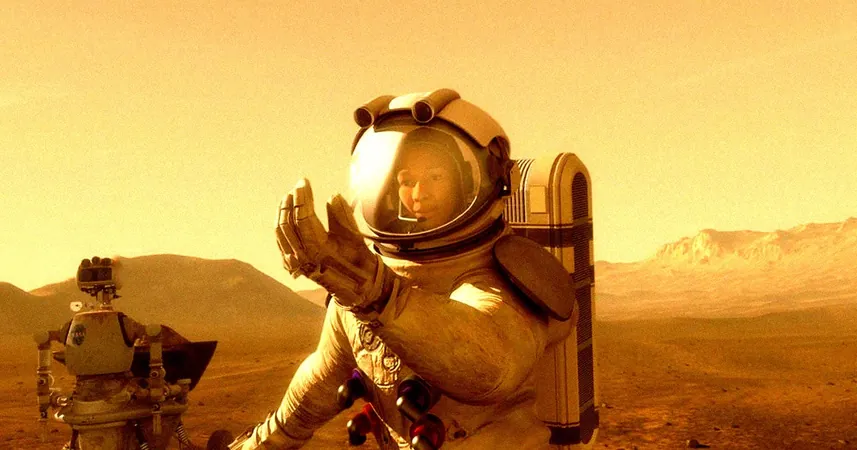
Elon Musk's Bold Mars Mission Faces Unexpected Health Risks
2025-03-30
Author: Yu
Introduction
For years, SpaceX CEO Elon Musk has driven forward his ambitious vision to colonize Mars, aiming to send humans to the Red Planet and establish a thriving city there. Using his game-changing Starship rocket, Musk's plans have gained traction, particularly as significant support from high-profile figures, including former President Donald Trump, has emerged. Trump’s advocacy for speeding up human trips to Mars raises questions about prioritizing such missions over NASA's lunar agenda.
Emerging Health Risks from Martian Dust
However, an emerging threat poses a significant challenge to Musk's dream. According to a recent study in the journal GeoHealth, Martian dust could be life-threatening for astronauts, jeopardizing their health even before they set foot on Mars.
Scientists have discovered that the fine particulate matter found in Martian dust may cause severe risks to astronauts' lungs. Justin Wang, a medical student at the University of Southern California and coauthor of the study, explained to CNN that inhaling this dust could lead to the accumulation of harmful substances in the lungs and bloodstream, with potential consequences for respiratory health: 'The biggest danger is the risk to astronauts' lungs,' he said.
Composition and Risks of Martian Dust
The potentially hazardous constituents of the dust, including silica and iron oxides, could cause pulmonary diseases, complicating matters further due to the increase in space radiation exposure. This multifaceted health risk draws attention to the dangers that astronauts may encounter when attempting to journey to Mars—a reality Musk himself has acknowledged.
Dust's Ubiquity and Historical Context
Despite these challenges, the Martian dust is everywhere. 'It’s constantly falling from the sky and covering everything,' said Brian Hynek, a geological sciences professor at the University of Boulder and coauthor of the research. Globally disruptive dust storms are frequent, once every few years, which exacerbate the issue by enveloping the Martian surface in thick layers of fine dust.
Dust isn’t merely a new obstacle in space exploration; it has proven troublesome in past missions. NASA's Apollo astronauts faced similar health concerns related to lunar dust, which also posed a significant risk. Robotic missions, like the 2021 InSight lander, have fallen victim to Martian dust too—its solar panels became inoperable after being coated in dust, leading to its untimely end.
Perilous Nature of Martian Dust
On Mars, dust is not just irritating; it can also behave in surprisingly perilous ways. University of Leicester research fellow Julia Cartwright pointed out that Martian dust particles are sharp and jagged, similar to asbestos, increasing the likelihood of respiratory irritation.
Challenges of Medical Support on Mars
Unlike the Moon, where astronauts had quicker access to Earth for medical support, a Mars mission lacks such immediacy. Communication delays of up to 40 minutes mean that astronauts would be left without rapid medical assistance in emergencies, heightening the stakes.
Conclusion
The researchers concluded their study with a clarion call for preparedness: 'To successfully explore Mars, we must be ready to prevent and treat various medical issues that may arise on its surface to ensure astronaut safety and mission success.'
With Elon Musk's Mars ambitions at risk from an unexpected foe, the quest to colonize the Red Planet faces more hurdles than ever before. As scientists continue to examine the dangers posed by Martian dust and other unforeseen challenges, the dream of human habitation on Mars remains tantalizing yet fraught with peril.



 Brasil (PT)
Brasil (PT)
 Canada (EN)
Canada (EN)
 Chile (ES)
Chile (ES)
 Česko (CS)
Česko (CS)
 대한민국 (KO)
대한민국 (KO)
 España (ES)
España (ES)
 France (FR)
France (FR)
 Hong Kong (EN)
Hong Kong (EN)
 Italia (IT)
Italia (IT)
 日本 (JA)
日本 (JA)
 Magyarország (HU)
Magyarország (HU)
 Norge (NO)
Norge (NO)
 Polska (PL)
Polska (PL)
 Schweiz (DE)
Schweiz (DE)
 Singapore (EN)
Singapore (EN)
 Sverige (SV)
Sverige (SV)
 Suomi (FI)
Suomi (FI)
 Türkiye (TR)
Türkiye (TR)
 الإمارات العربية المتحدة (AR)
الإمارات العربية المتحدة (AR)